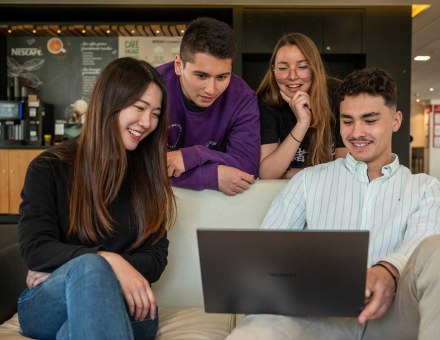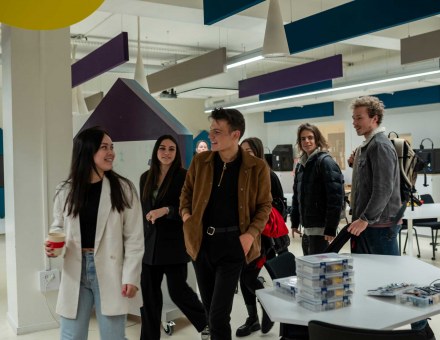True to its objective of training students in the hands-on skills needed to design actionable consulting strategies, the four-month Consultancy Challenge plunges participants into the reality of strategizing on behalf of a corporate client. Run by Professors Patrick Besson and Guillaume Carton and assisted by a practicing consultant, the 60 students of the current cohort were tasked with modeling a real business case before presenting in front of an adjudicating panel in January. A steep and invaluable learning curve for all involved.
Starting in October of the academic year, this capstone project is intentionally scheduled to let students develop core knowledge early into the MSc in Strategy & Consulting before tackling the altogether more “in the field” scenario simulated by the four months spent working in groups of 5-6. For Guillaume Carton (Associate Professor of Strategy at emlyon business school), this is key to the success of the project: “we want students to face this challenge with a certain knowledge base behind them but also confront them from the outset with the reality of devising a workable corporate strategy in full-on consultant mode. In so doing, they get to display what they already know and, above all, learn so much more along the way. About themselves as well as the kind of real consulting challenges they’ll face in their future career”.
A Hands-On Consulting Experience

Once the student working groups have been established and projects chosen, they get to work over the ensuing months on a multi-phase analysis of their respective company projects, a process that involves not only understanding the corporation under analysis but also coming up recommendations and anticipating the kinds of questions they will be posed when presenting their final proposal. For student Victor Fitament, the experience took him out of his comfort zone, in the most positive sense: "for me, the Consultancy Challenge is the most stimulating exercise in the program. It's as much a leap into the unknown as it is an expression of the progress I'm making throughout the Master's program. The early days of the project were testing: a new team, new work bases, a new perception of the world. With an international team from different backgrounds, we had the opportunity to exchange ideas and get to know each other, both professionally and personally.” .
Developing Teamwork and Communication Skills in Strategy
The groupwork nature of the exercise also delivers valuable lessons in pulling together on a common project, a sentiment echoed by student Christina Philipson: “contrary to my expectations, the challenge has proven to offer lessons about team dynamics and my role within—something I initially anticipated the least but now appreciate the most. Our focus was a digital healthcare platform, concerning a strategic question of future growth following a period of significant expansion. Throughout the project, we developed and reviewed several different options, and finally proposed geographic expansion.”
One of the methodologies espoused by the challenge is to have students constantly working on and re-working their final proposal. The aim is to crystallize into a mere ten slides, a succinct exposition of the student teams’ analysis and recommendations, with a summary report provided in advance. This tests more than just the students’ core knowledge, as underlined by Niamat Aboulazhar: "the Consultancy Challenge offers a practical, collective first taste of a strategic consultant’s work. While analytical and relying on hard skills taught during the semester it also represents a distinctive experience deepening our understanding of our targeted companies, in my case Ariane Group. It is an opportunity to develop our analytic and argumentative mindset and communication methods by confronting individual ways of thinking and learning from one another with our group, classmates, and teachers."
Gaining Real-World Consulting Experience

Whilst the challenge consists of an exercise that is part-simulation, the techniques adopted and the ways of working developing by each group are very real – the project has been carefully designed to ensure that the whole ideation, modeling and argumentation process that each participating student goes through is as close to the reality of the profession of strategic consultant. For Luci Strcic, member of a student team working on Vision Rwanda 2050 and focusing on the critical role of education in sectoral development, this was very much the case: “the task at hand involves extensive research and the development of realistic strategies, emphasizing the consultant's role to provide practical, actionable advice grounded in real-world contexts. Navigating through this project with a team of varied expertise has highlighted the complexities of strategic consulting. While communication and aligning different perspectives can be challenging, it has been a valuable process of learning and growth, reflecting the essence of strategic consultancy.”
The Culminating Presentation: A Realistic Consulting Scenario
The culminating presentation in January is a deadline towards which the student teams work from the very outset, constantly re-thinking their analysis, tailoring their recommendations, preparing for the potential interrogation they will receive, and re-working their final presentation. The aim, though, is constructively educational and the experience highly beneficial for all. For Victor, the presentation provided “the perfect conclusion to our work, where our labors were given due consideration as a team. Right until the end, we had this momentum to drive our proposal through in the same direction.” For Christina, the testing nature of delivering and defending their analysis and recommendations was especially beneficial: “the final presentation was an opportunity to test our findings and discuss how the firm based on our proposal should balance both advancements, competition, and any resilience or insufficient readiness in the market. The conclusion to the project created a healthy sense of urgency and need for action to supporting our strategic proposal.”
Read more :


